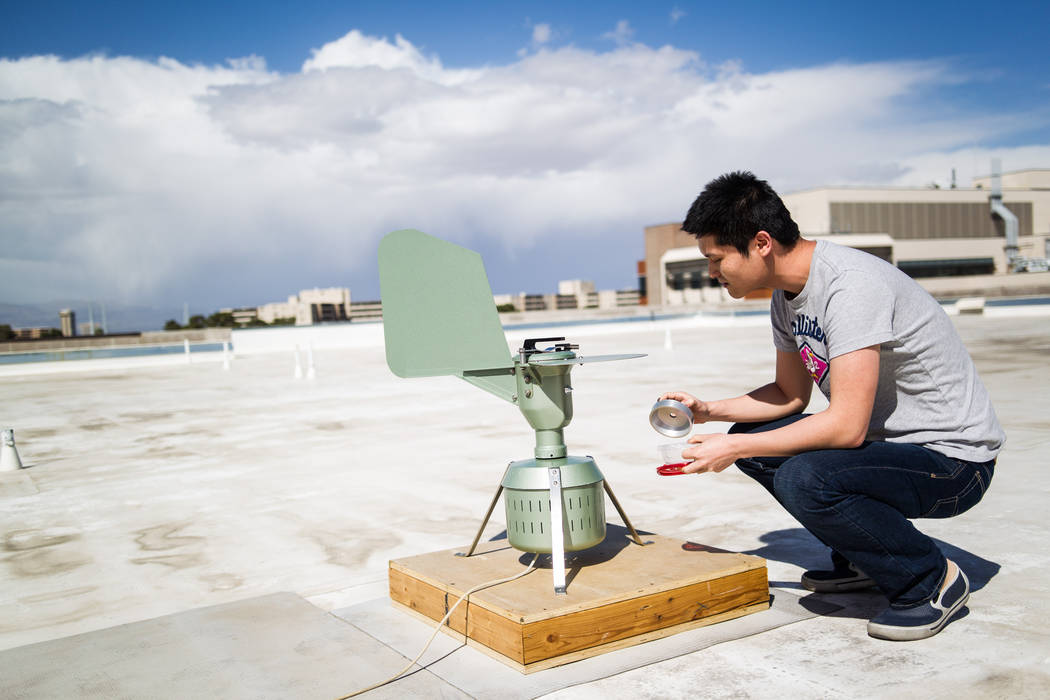Allergy sufferers in Las Vegas Valley can blame ragweed
If you suffer from springtime allergies, here is some news your nose already knows: Pollen season isn’t over yet in the Las Vegas Valley.
Though common allergens such as ash, mulberry and olive appear to have run their course, ragweed is still going strong, according to the folks at UNLV who monitor such things.
And this year’s crop has been bolstered by unusually wet conditions in Southern Nevada.
“The rain actually brings up more ragweed,” said Asma Tahir, pollen program supervisor for UNLV’s School of Public Health.
The program collects daily air samples from five locations — UNLV, Palo Verde High School in Summerlin, Neal Elementary School in the northwest valley, Mack Middle School in the east valley, and J.D. Smith Middle School in the central valley. A sixth station in the desert near Jean provides a snapshot of normal background pollen levels outside the valley’s man-made forest of allergy-inducing plants.
Despite the bumper crop of ragweed, Tahir said overall pollen levels this season have been “pretty much the same as we’ve seen in past years.”
Only the timing was different.
This year’s allergy season started about two weeks later than usual, thanks to some abnormally cold weather — including a rare valley snow storm — in late-February, Tahir said.
Retired allergist Dr. Joram Seggev said the pollen should begin to ebb when the summertime heat takes hold and temperatures regularly rise into the upper 90s.
“We’re over the peak of pollen levels, but it definitely is ongoing,” Seggev said. “Ragweed has been particularly bad this season.”
The Clark County Department of Air Quality used to track airborne pollen levels and issue daily reports to the public, but the effort was discontinued in 2010 when funding was lost. UNLV and the Clark County School District revived the monitoring program in 2014, with cooperation from Seggev and the county.
Daily pollen readings are now fed to a website hosted by the American Academy of Allergy, Asthma & Immunology’s National Allergy Bureau. Long-term data collected through the program is being used to research everything from asthma to climate change.
With additional grant funding, Tahir and company would like to add two new pollen stations in Henderson and the southwest valley and hire more staff to help collect and read samples.
Seggev said seasonal allergies can cause symptoms such as fatigue; itchy, watery eyes; itchy or achy ears; nasal congestion; and worsening asthma. Oddly, he said, people who are allergic to ragweed might also experience an itchy sensation on their palate when eating melon — especially honeydew — during pollen season.
The good news: There is a host of over-the-counter allergy pills and nasal sprays on the market to control the symptoms of the season, Seggev said. “People can actually treat themselves fairly well, if they do it correctly.”
But ragweed sufferers in Southern Nevada enjoy a unique brand of hell, he said.
In the Midwest and the East, ragweed season typically starts in August and lasts through the first frost. Here in the Southwest, the plant blooms twice a year, pumping out its potent pollen in both spring and fall, Seggev said.
Contact Henry Brean at hbrean@reviewjournal.com or 702-383-0350. Follow @RefriedBrean on Twitter.
Tips to ease your pain
Retired allergist Dr. Joram Seggev recommends the following tips to ease your suffering during allergy season:
— Keep the windows closed in your house and car. Invest in high-quality filters and run the air conditioner in recirculation mode.
— If you have to go out, wear a mask over your nose and mouth and wrap-around sunglasses to protect your eyes from irritants.
— Shower and wash your hair before you go to bed at night. Rinse your nose with saline solution.
— Change your clothes and keep your unwashed laundry away from where you sleep.
— Keep pets indoors as much as possible and don't let them on your bed after they have been outside.
— For most people, allergy symptoms are worst in the morning, so take long-lasting allergy medication before you go to bed at night so you are protected when you awake.



















